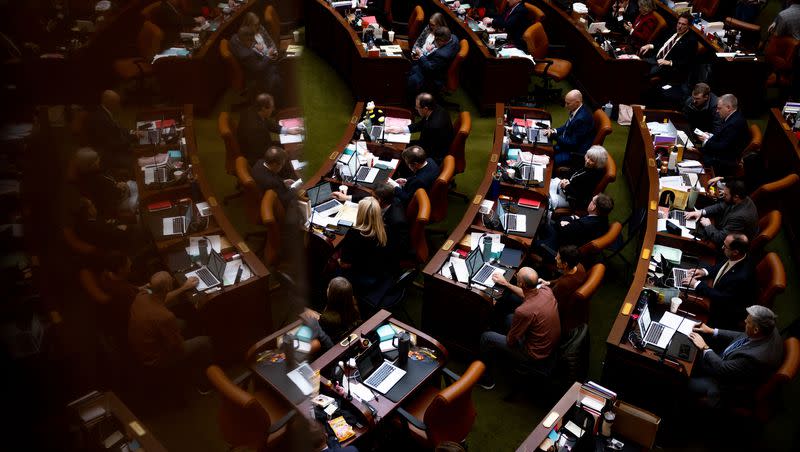Opinion: Why Utahns like the Legislature — but not Congress

Your columnists are grateful to write for a newspaper that values survey research. Good polling helps educate readers and decision-makers regarding opinions of Utahns. Equally important, it feeds the deep addiction we have for political polls. We will report on voter sentiment on other issues in future columns.
A recent Deseret News/Hinckley Institute of Politics poll revealed that 53% of Utah voters approved of the performance of the Utah Legislature in the last session, with 33% disapproving. Two-thirds of Republicans were satisfied with lawmakers and two-thirds of Democrats were not. State officials were pleased with these numbers. Should they be pleased, and what do the results imply?
Pignanelli: “Legislative approval is particularly low in states with highly professionalized legislatures … and highest in states with citizen legislatures, such as … Utah.” — Lilliard Richardson, Harvard Cooperative Election Study
What?!!! A third of Republicans do not approve of the session filled with tax cuts, deregulation, and action on many conservative issues? Perhaps some dislike the education scholarship program or the new state flag. Regardless, this is a hard-to-please group.
The survey results demonstrate the Legislature is fulfilling a role in a representative democracy by reflecting the desires of most constituents.
Other important implications also abound. Early versions of most bills were restrictive but moderated in the process to allow flexibility for businesses and individuals. Such consensus building is supported in the polls. Further, the Legislature was aggressive in so many areas that there was much to like and dislike — which possibly determined the results.
Legislative leaders are appropriately pleased with the poll. Despite disapproval from both political sides, most voters favored an action-packed session.
Webb: It’s a good approval rating for a legislature, especially given the fact that news coverage of the Legislature tends to focus on the most sensational, controversial bills and is generally more negative than positive. The reality is that in the last session the most extreme legislation was toned down or killed. Lawmakers had relatively few serious fights with the governor. The Legislature, for the most part, reflected the wishes of the electorate and it shows in the polling.
A recent survey by Pew Research Center showed 60% of Americans disapproved of President Joseph Biden’s performance and only 26% had a favorable opinion of Congress. Why the sharp contrast with the positive perception Utahns have of their officials? Can the federal officials really be that unpopular?
Pignanelli: In the 21st century all presidents faced similar negative metrics other than short-term boosts of popularity in unusual circumstances. Biden’s perceived left-wing agenda further compounds this inherent unpopularity in Utah.
Americans traditionally have issues with Congress, but usually support their own representatives and senators — which explains the high incumbency reelection rates. A new dynamic is both Republican and Democrats are disgruntled with the federal legislative bodies even when their own party is controlling them. This troubling signal elucidates why low levels of support plague American institutions. There is increasing angst over inaction on major issues while Congress continues to unload their constitutional responsibilities on executive agencies. As usual, how Utah officials legislate, build consensus and strive for bipartisanship offers direction for Washington, D.C.
Related
Webb: Citizens everywhere, and especially in Utah, trust their state and local governments more than the federal government. They believe state and local officials will use their tax dollars more wisely than their federal counterparts.
Part of the reason for high amounts of political anger, alienation and decline in civil discourse is the level at which government actions are taken and decisions are made. When highly divisive decisions are made at the federal level, citizens feel hopeless, like nothing can be done. After all, how do you really make a difference in Congress, or in the massive, all-powerful federal bureaucracy in faraway Washington, D.C., if you’re not incredibly rich and powerful? The only ones with real clout are big corporations, big tech and the Hollywood elite, who can hire legions of lobbyists. The average citizen hasn’t got a chance.
By contrast, at the state and local levels, citizens actually have a realistic opportunity to influence public policy. We see it all the time. Your state legislators and county and city leaders are accessible. They listen. They act. They solve problems.
Certainly, big, divisive controversies exist at state and local levels that create anger and conflict. State and local levels are by no means perfect. Some fail spectacularly. Some very nasty political battles occur there.
But such fights are resolved much faster than at the federal level. Things get sorted out, with red and blue states and localities settling on policies a majority of constituents support.
Also, it’s better for a city, county or state to struggle under poor public policy than the entire nation suffer. If a state or big city liberals pass laws I don’t like, I can at least say, “Well, that’s what they want. Glad I don’t have to live there.” I can’t do that if Congress passes stupid laws. All I can do is fume futilely.
The poll also indicates that 34% of Utahns believe the governor has the most influence in the state, while 34% believe legislative leaders enjoy that status, and 15% give the honor to local officials. Any surprises in this?
Pignanelli: Balanced recognition to the executive and legislative branches is understandable. The deference to local officeholders is intriguing. Deeper thought suggests that because those who control garbage pickup, potholes, public safety and traffic have influence on everyday lives.
Webb: The balance is right. Vigorous tension among branches of government is healthy.
Republican LaVarr Webb is a former journalist and a semiretired small farmer and political consultant. Email: lwebb@exoro.com. Frank Pignanelli is a Salt Lake attorney, lobbyist and political adviser who served as a Democrat in the Utah state Legislature. Email: frankp@xmission.com.

